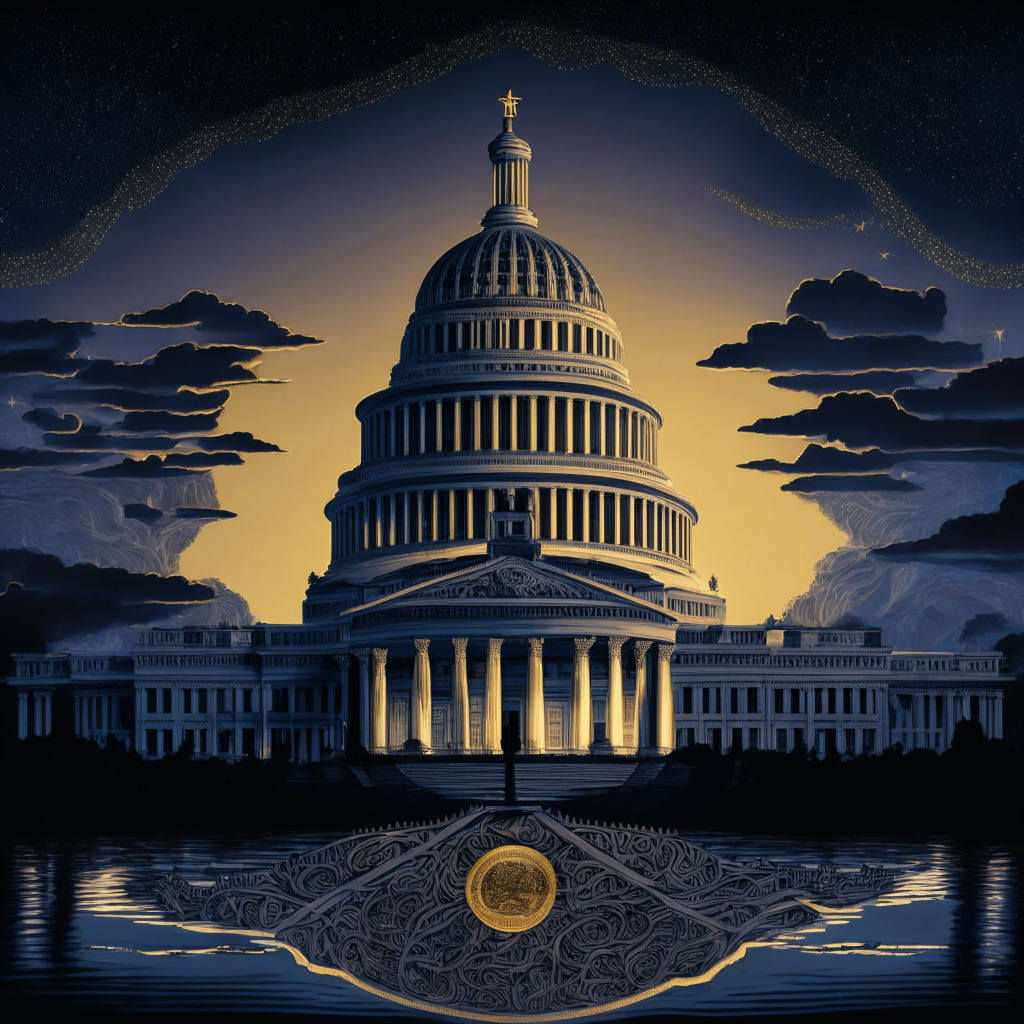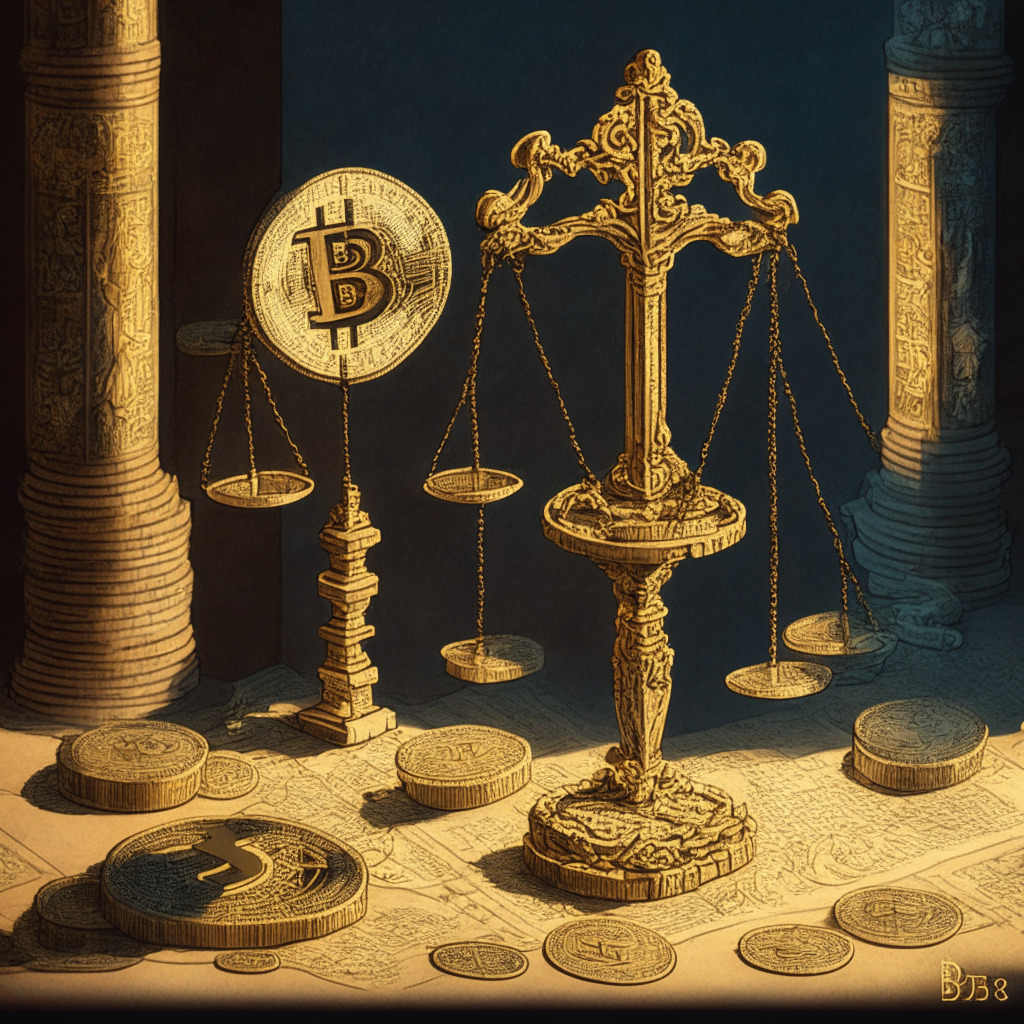The SEC has filed a lawsuit against internet marketer Richard Heart for orchestrating unregistered securities offerings, deceiving investors, and misusing funds. Heart’s projects, Hex, PulseChain, and PulseX, promised immense wealth but have been met with instability and legal troubles. This highlights the necessity for transparency and regulatory compliance in the crypto landscape.
Search Results for: U.S. SEC
Tether’s Rising Treasury Reserves: A Balancing Act between Expansion and Security
“Tether recently disclosed a Q2 attestation, revealing a $3.3 billion jump in its excess reserves. Despite raising market concerns due to increasing U.S. Treasury bill holdings, Tether maintains 100% reserves for USDT tokens and continues growing financially. Transparency around reinvested profits becomes key to investor confidence.”
Coinbase vs. SEC: The Battle for Crypto Diversity Dependent on Bitcoin Only Policy
“Coinbase CEO, Brian Armstrong, recently claimed that the SEC instructed the crypto exchange platform to delist all cryptocurrencies except for Bitcoin. He believes this perspective, which sees all cryptos bar Bitcoin as securities, does not align with their understanding of legislation and could spell the end for the U.S. crypto industry.”
Overturned SEC Ruling on SPIKES Index: What it Means for Crypto Regulation
“The U.S. SEC’s ruling exempting SPIKES Index from security futures has been overturned by the D.C. Circuit. The decision transitions SPIKES Index futures back to securities futures, affecting market participants and possibly influencing upcoming disputes between cryptocurrency firms and the SEC.”
Ripple’s Resilience Amid SEC Trials: Overcoming Adversities in Blockchain Innovation
Despite ongoing legal battles with the U.S. Securities and Exchange Commission, Ripple maintains strong ties with central banks and continues to innovate in the crypto sphere. Their latest venture, a U.S. dollar-pegged stablecoin running on the XRP Ledger, manifests Ripple’s commitment to exploring blockchain potentials.
Unraveling SEC’s Cybersecurity Disclosures: Balancing Investor Trust and Corporate Burden
The Securities and Exchange Commission (SEC) has directed all listed entities, including cryptocurrency enterprises, to annually disclose their “cybersecurity risk, management strategy, and governance.” Firms need to report major cybersecurity incidents within four days, elaborating on the attack’s nature and timing. The new regulation is introduced to fortify investor trust and encourage companies to adopt stringent cybersecurity measures.
U.S. Senate Tightens Crypto Regulations in NDAA 2024: A Necessity or Threat to Blockchain Freedom?
The U.S. Senate’s passage of the 2024 National Defense Authorization Act introduces tighter regulations for financial institutions engaged in crypto trading, marking a significant legislative shift. The bill targets crypto mixers and “anonymity-enhancing” crypto assets and aims to strengthen compliance with money laundering and sanctions laws.
Twitter Handle Takeover Dispute & The Fight for U.S. Crypto Legislation Clarity
“In a recent turn of events, Twitter handle @X was reportedly confiscated and offered to the user as merchandise and a visit to the company after Elon Musk announced a rebranding under the banner ‘X’. Meanwhile, Coinbase CEO has implored US citizens to cast a ‘yes’ vote for the FIT21 Act, fostering innovation and providing regulatory clarity for crypto firms.”
Sweeping U.S. Regulatory Acts: Crypto Advancement or Investor Risk?
The House Financial Services Committee approves a bipartisan bill, Financial Innovation and Technology for the 21st Century Act, aiming to provide regulatory clarity for cryptocurrencies. The Act delineates registration requirements for crypto firms and seeks to define if a cryptocurrency is a security or a commodity, extending the CFTC’s control over the crypto industry.
Bitcoin Surfs Above $29,000 Amid U.S. Monetary Shift: Musk’s DOGE, Market Outlooks, and Inflation Fears
Despite the U.S. Federal Reserve’s impending hawkish shift, BTC maintains support above $29,000, while most other cryptos face a gloomy market. DOGE uniquely rose 8%, potentially due to rumors of wider crypto usage in Elon Musk’s new Twitter platform, X.
Blockchain’s Role in Securing the AI-Driven Future: An Essential Counteraction to AI Threats
“AI’s potential benefits come with risks, such as new attack avenues for cybercriminals. Blockchain technology could counter these security threats introduced by AI. Its immutable, decentralized storage combats unauthorized modifications or tampering with datasets that define AI models, assuring data integrity and preventing unauthorized AI utilization.”
Legal Battle Heats Up: Unraveling the Binance, CZ, and SEC Conflict
The CFTC filed a complaint against Binance, accusing it of violating laws by offering unregistered crypto derivatives in the US. The SEC has also brought charges against Binance and its founder for flagrant disregard of federal securities laws.
Binance’s Audacious Stand Against U.S. CFTC: A Game-Changer for Crypto Regulations
“Cryptocurrency exchange, Binance, plans to challenge the U.S. Commodity Futures Trading Commission’s lawsuit against it over alleged illegal activities. This audacious move may change the landscape of cryptocurrency regulation within the U.S., setting precedent for future cases and influencing the future of cryptocurrency market.”
The Future of XRP Amidst Possible SEC Appeal: Threat or Opportunity?
Recent discussions about a possible U.S. SEC appeal against a ruling favoring XRP holders have caused concerns among cryptocurrency enthusiasts. Attorney John Deaton allays fears, indicating the SEC appeal might not significantly threaten XRP holders. Despite potential appeal taking two years, Deaton remains optimistic about the win’s significance for XRP and Ripple.
Navigating the Pros and Cons of the U.S. House Republicans’ New Crypto Oversight Bill
“The Financial Innovation and Technology for the 21st Century Act by U.S. House Republicans aims to provide a sound regulatory framework for crypto investors protection. The bill seeks to establish clear regulatory principles balancing progressive tech with protective legislation, which, if successful, may streamline the fragmented regulation landscape in the U.S. and serve as a global blueprint.”
Roadmap to Regulations: Unveiling the U.S. Senators’ Bill for Comprehensive Crypto Laws
U.S. Senators Cynthia Lummis and Kirsten Gillibrand unveiled a revised draft for comprehensive crypto regulation, marking an evolution from a previous draft penned a year ago. The bill addresses decentralized finance definition, anti-money laundering provisions, custody rules and grants the CFTC decisive control over crypto issuers, alongside defining roles for the SEC.
Implications of XRP’s Landmark Security Ruling: Impact on Crypto Lender Celsius and Future of Cryptocurrency Regulation
The recent ruling classifying XRP as a security could impact creditor repayments for holdings of crypto lender Celcius’ token CEL under U.S. bankruptcy laws. This decision, alongside Celcius’ legal challenges, marks a significant shift in cryptocurrency regulation, potentially impacting investor trust in crypto assets.
Navigating the Ripple: SEC’s Mixed Feelings on Court’s Verdict and What it Means for Retail Investors
The SEC Chair, Gary Gensler, has mixed feelings about a recent Ripple case ruling. Despite the court’s decision that token sales are not classified as securities sales, the SEC continues the case exploration, creating an air of unpredictability for potential market entrants. Gensler defends SEC practices, highlighting their proactive rulemaking to better regulate the crypto landscape.
Crucial Steps in SEC vs Ripple Case: A Litmus Test for Crypto Regulations and Market Impact
U.S. District Judge Analisa Torres referred the ‘SEC versus Ripple’ case to Magistrate Judge Sarah Netburn, signaling potential settlement discussions. Judge Torres dismissed the claim that Ripple broke the law by listing XRP on public exchanges, landmark progress suggesting XRP isn’t a security. However, speculation about XRP being sold as a security when Ripple marketed it to investors still prevails.
Ripple’s XRP Classification: A Security for Some, a Cryptocurrency for Others
“The recent court ruling designates Ripple’s XRP as an unregistered security when traded by institutional investors, not for other investors. This ruling followed a lawsuit by the Securities and Exchange Commission and has led to soaring XRP prices. However, it doesn’t clarify the legal status of cryptocurrencies in the US, maintaining the divide between retail and institutional investors. Crypto law remains complex and ever-changing.”
Navigating the SEC Scrutiny: Bitcoin ETFs and the Crypto Market’s Resilience Vs Regulations
The U.S. SEC is launching a thorough examination of new Bitcoin ETF proposals by Wise Origin, WisdomTree, VanEck, Invesco Galaxy, and ARK 21Shares. This process could bring more stability and security to the crypto market, but simultaneously threatens the optimism surrounding the future of Bitcoin ETFs due to possible tighter regulations. Despite this, the agreement between Coinbase and Cboe indicates market resilience in face of regulatory scrutiny.
Ripple Labs’ Victory Versus SEC and the Juggling Act of Crypto Reality
“In a significant verdict, a New York court ruled in favor of Ripple Labs declaring XRP as not a security, leading to a surge in its value. However, the judgement is partial, maintaining Ripple Labs’ regulatory uncertainty. Meanwhile, major developments include the arrest of Celsius Network’s former CEO, Europe’s first Bitcoin ETF debut, and Binance’s workforce reduction amidst US regulatory crackdown.”
Coinbase Staking Services Halted: An Ongoing Battle with the SEC & Its Potential Impact on the Crypto Industry
Coinbase, US-based cryptocurrency exchange, has temporarily halted staking services in four US states following SEC’s lawsuit accusing them of selling unregistered securities. Amid regulatory scrutiny, Coinbase argues that their staking services aren’t securities, challenging established legal protocols and definitions of investment contracts.
Unpacking the Coinbase Controversy: SEC Approval vs Endorsement of Blockchain Businesses
The SEC argues that its approval of Coinbase’s public listing should not be misconstrued as backing the company’s business model or regulatory compliance. This counterargument arises as the SEC faces scrutiny over its diligence and oversight of rapidly evolving blockchain companies preparing to go public.
Regulatory Body vs Coinbase: The Future Precedence of Staking Services as Securities
“Cryptocurrency exchange Coinbase has temporarily paused staking of assets in response to legal procedures from local regulators. This follows a lawsuit accusing Coinbase of offering unregistered securities, leading to regulatory action in states. Despite disagreements, Coinbase is choosing to comply until fully defending itself.”
Unexpected Ripple Labs Victory: A Setback for SEC or a Starting Point for Crypto Legislation?
“A Federal Judge contended that the SEC’s case against Ripple Labs was deficient, significantly impacting the narrative around securities regulation in the crypto industry. This judgement doesn’t label Ripple’s XRP as a security, but questions the SEC’s success in regulating crypto. Urgency arises for clear regulatory framework in line with technology.”
Ripple’s Partial Victory vs SEC: Impact on XRP and Future of Crypto Regulations
Crypto firm Ripple Labs had a partial victory against the U.S. Securities and Exchange Commission (SEC) shaping the crypto regulatory environment. The court ruled Ripple’s XRP token exchange isn’t an investment contract, but the sales to institutions violated federal securities laws.
Crypto Regulation Spotlight: Mashinsky’s Detainment Fuels Debate on SEC Oversight and CFTC Role
Alex Mashinsky’s detainment on allegations of wire fraud, securities fraud, and price manipulation intensifies discussions on crypto regulation. Mashinsky’s case, alongside a ruling favoring Ripple, could have significant implications for platforms like Binance, Coinbase, and Bittrex that have faced SEC accusations. The situation underscores the need for a comprehensive regulatory regime to counter potential frauds in the crypto market.
Court Ruling Clears XRP as Security: An Opportunity or Challenge for Crypto Industry?
“A U.S. district court’s ruling establishes that Ripple’s XRP token isn’t a security if sold via an exchange, providing relief for XRP investors. This decision marks a turning point for the digital assets framework, suggesting a possible shift in perspective for institutional investors previously wary of regulatory complications within the crypto industry.”
Regulating Digital Assets: The SEC’s Paradox, Investor Protection versus Technological Growth
Congressman Ritchie Torres criticizes SEC’s inconsistent approach to digital assets, highlighting the dubious licensing of a particular trading platform. Torres questions if this strict regulatory approach is protecting investors or hindering technological innovation, emphasizing the need for a balance between regulation, investor protection, and progress in digital asset market.
Coinbase vs SEC: How a Supreme Court Ruling Could Impact Future Cryptocurrency Regulations
In facing litigation with the U.S. Securities and Exchange Commission (SEC), Coinbase draws parallels with a recent Supreme Court judgment on student debt cancellation. The cryptocurrency platform is challenging the SEC’s regulatory authority over digital assets, highlighting the lack of ‘clear congressional authorization.’ This lawsuit could significantly impact cryptocurrency regulations and the digital asset industry.
Legal Limbo: Examining the Ripple Case and its Impact on U.S. Cryptocurrency Regulation
Recently, judge Analisa Torres delivered a split decision in SEC v. Ripple Labs, implying legal ambiguity surrounding cryptocurrency tokens. She supported Ripple’s sales of tokens on asset exchanges while contesting institutional sales. This inconsistency leads to uncertainty in the crypto market, which can only be addressed by Congress stepping in to establish standardized regulations.































